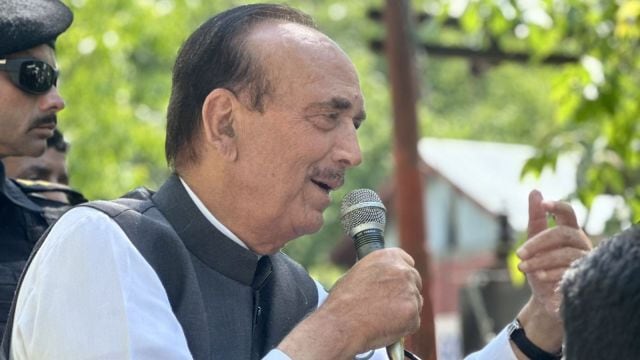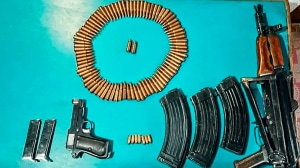Months after assembly poll rout, Ghulam Nabi Azad dissolves all units of his party
Bashir Arif, secretary to Azad, said the decision was to help fill up vacancies following the resignation of some party leaders and aimed at bringing new faces, especially youth and women.
 Azad had launched his outfit last year after quitting the Congress, hoping that it would emerge as a key player in J&K politics. (X/ @ghulamnazad)
Azad had launched his outfit last year after quitting the Congress, hoping that it would emerge as a key player in J&K politics. (X/ @ghulamnazad)Less than six months after his Democratic Progressive Azad Party unsuccessfully made its maiden electoral foray in the assembly polls in Jammu and Kashmir, former Chief Minister Ghulam Nabi Azad Monday dissolved all the units of the party.
“Ghulam Nabi Azad, chairman of the Democratic Progressive Azad Party (DPAP), has dissolved all party units — including state, provincial, zonal, district, and block-level committees — as well as the positions of chief spokesperson and other spokespersons,’’ read a statement issued by Bashir Arif, secretary to the DPAP chairman, Azad. “These committees will be reconstituted in due course of time.”’
When contacted, Arif told The Indian Express that the decision was to help fill up vacancies following the resignation of some party leaders and aimed at bringing new faces, especially youth and women.
However, the decision appears to have taken many DPAP leaders off guard, with several voicing their surprise. One leader said: “We heard about it (the party’s decision to bring in new faces). It’s puzzling because who are these new faces going to be given that most people have left?”
Congressman Ghulam Nabi Azad founded DPAP on September 26, 2022 – just over a month after he left the Congress – hoping it would emerge as a key player in J&K politics.
In December 2022 — three months after Azad floated his party — Azad expelled three senior leaders, Tara Chand, former minister Dr Manohal Lal Sharma and ex-MLA Balwan Singh, in December for alleged anti-party activities. This was followed by the resignation of nearly 126 DPAP supporters, including many founding party members such as former minister Peerzada Sayeed in January last year.
The exodus brought on taunts from his Congress party, with Congress general secretary Jairam Ramesh tweeting on X that “21 leaders of DAP (Disappearing Azad Party)” rejoining the Congress, “including one who filed a defamation case against me on behalf of Ghulam Nabi Azad”.
Meanwhile, the DPAP failed to make a mark in both the Lok Sabha elections in which it contested from three seats, and the assembly polls, in which 23 candidates were fielded in the 90-member assembly, with its candidates securing even lower votes than NOTA in at least half a dozen seats in the latter. One of these seats was Doda West in Doda, Azad’s home district.







